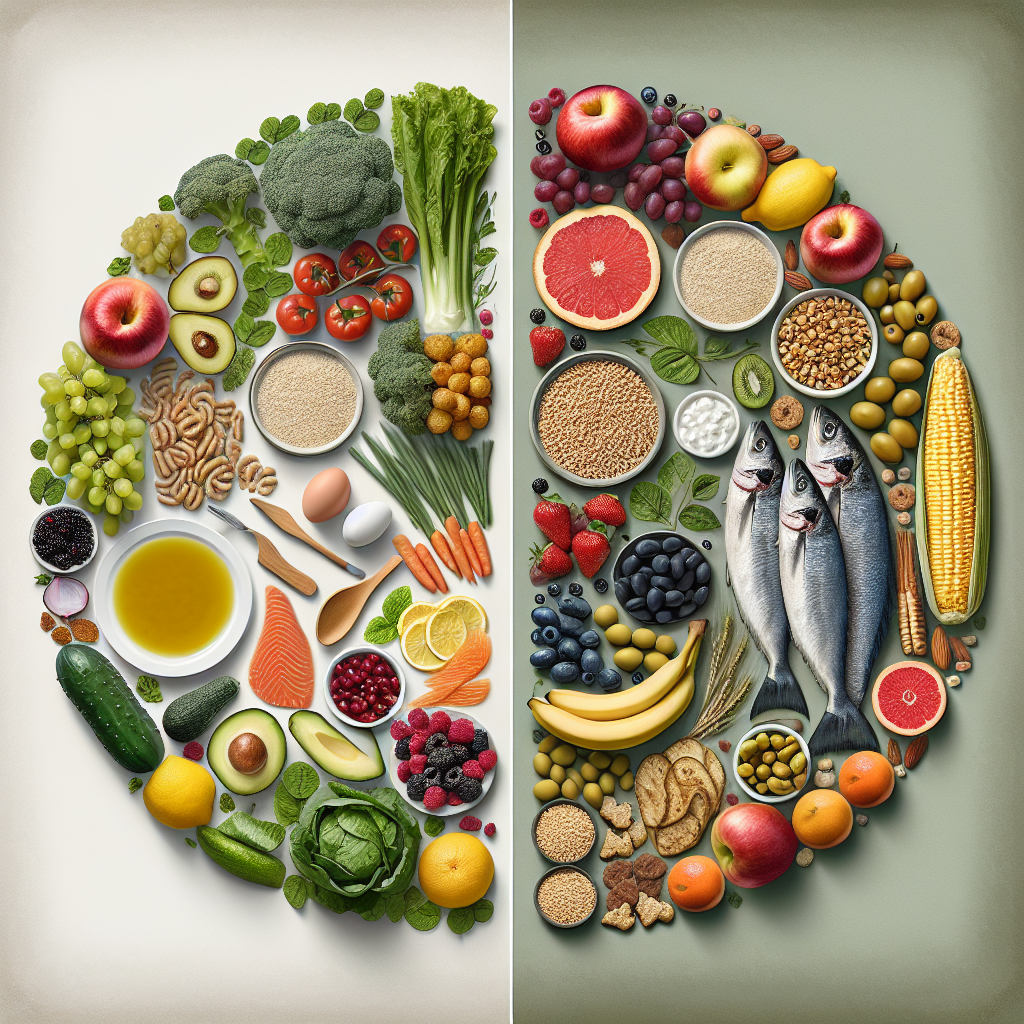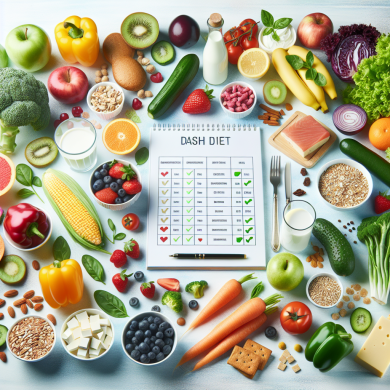DASH vs. Mediterranean: A Dietary Showdown
In the world of healthy eating, two diets have consistently stood out for their benefits in promoting heart health and overall well-being: the DASH (Dietary Approaches to Stop Hypertension) diet and the Mediterranean diet. While both have been lauded for their health benefits, they offer different approaches to eating. This article delves into the details of these two diets, comparing their principles, benefits, and drawbacks, to help you decide which might be best suited for your lifestyle.
Understanding the DASH Diet
The DASH diet was developed to combat high blood pressure, or hypertension. It emphasizes a reduction in sodium intake and encourages the consumption of nutrient-rich foods that are low in saturated fats. The primary goal of the DASH diet is to help individuals maintain a healthy blood pressure level, but it also promotes overall heart health and weight management.
Core Principles of the DASH Diet
The DASH diet is centered around the following guidelines:
- Consume plenty of fruits and vegetables.
- Include whole grains as a staple in your meals.
- Opt for fat-free or low-fat dairy products.
- Incorporate lean protein sources like poultry, fish, and nuts.
- Limit the intake of red meat, sweets, and sugary beverages.
- Restrict sodium intake to 2,300 milligrams per day, with an ideal limit of 1,500 milligrams for people with hypertension.
Exploring the Mediterranean Diet
The Mediterranean diet is inspired by the traditional eating patterns of people living in countries bordering the Mediterranean Sea. Known for its heart-healthy benefits, the Mediterranean diet emphasizes the consumption of healthy fats and a variety of plant-based foods.
Core Principles of the Mediterranean Diet
The Mediterranean diet is based on these key principles:
- High consumption of fruits, vegetables, legumes, and whole grains.
- Use of olive oil as the primary source of fat.
- Moderate consumption of fish and poultry.
- Limited intake of red meat and processed foods.
- Inclusion of dairy products, primarily in the form of cheese and yogurt, in moderation.
- Regular consumption of nuts and seeds.
- Moderate wine consumption, typically with meals.
Comparing Health Benefits
Both the DASH and Mediterranean diets offer a range of health benefits, particularly in terms of cardiovascular health. However, they achieve these benefits through slightly different mechanisms.
DASH Diet Benefits
The DASH diet is particularly effective at reducing blood pressure, thanks to its emphasis on low sodium intake and high consumption of potassium-rich foods. These elements work together to relax blood vessels and reduce hypertension. Additionally, the diet’s focus on whole grains, fruits, and vegetables ensures a high intake of fiber, which aids in digestion and weight management.
Mediterranean Diet Benefits
The Mediterranean diet’s reliance on healthy fats, particularly from olive oil and fish, contributes to its heart-protective qualities. These sources of omega-3 fatty acids help reduce inflammation and improve cholesterol levels. The diet’s emphasis on whole foods and antioxidants from fruits and vegetables also plays a crucial role in preventing chronic diseases.
Weight Management and Sustainability
When it comes to weight management, both diets have their strengths. However, their sustainability can vary based on personal preferences and lifestyle factors.
DASH Diet and Weight Loss
The DASH diet can be effective for weight loss due to its low-calorie, nutrient-dense food choices. By prioritizing whole foods and limiting processed items, individuals can naturally reduce calorie intake while feeling satiated. However, its strict sodium limitations may be challenging for some people to maintain long-term.
Mediterranean Diet and Weight Loss
The Mediterranean diet is often praised for its sustainable approach to weight management. Its flexibility allows for a wide variety of foods, making it easier for people to adhere to over the long term. The diet’s focus on healthy fats and fiber-rich foods helps individuals feel full and satisfied, which can prevent overeating.
Potential Drawbacks
While both diets are generally considered healthy, they do have potential drawbacks that might affect their suitability for certain individuals.
DASH Diet Drawbacks
The strict sodium restrictions of the DASH diet can be difficult for some people to adhere to, especially if they are accustomed to a high-sodium diet. Additionally, the emphasis on low-fat dairy and lean meats may not appeal to those who enjoy richer, fattier foods.
Mediterranean Diet Drawbacks
The Mediterranean diet’s liberal use of olive oil and nuts can lead to higher calorie intake if portion sizes are not monitored. This aspect might not be ideal for individuals aiming for significant weight loss. Moreover, the inclusion of wine might not suit those who prefer to abstain from alcohol.
Choosing the Right Diet for You
Ultimately, the choice between the DASH and Mediterranean diets should be based on personal preferences, health goals, and lifestyle factors. Here are some considerations to help guide your decision:
Consider Your Health Goals
If your primary goal is to lower blood pressure or manage hypertension, the DASH diet may be more suitable for you. On the other hand, if you’re seeking a broader approach to heart health that includes healthy fats, the Mediterranean diet might be the better option.
Evaluate Your Dietary Preferences
Consider which diet aligns better with your taste preferences and eating habits. If you enjoy a variety of foods, including healthy fats and moderate alcohol consumption, the Mediterranean diet may be more appealing. If you prefer a diet with clear guidelines and lower fat content, the DASH diet could be the right fit.
Think About Long-Term Sustainability
Both diets can be sustainable if they fit well with your lifestyle. Consider which diet you can realistically maintain in the long term. The Mediterranean diet’s flexibility might make it easier for some individuals to adhere to over time.
Conclusion
In the battle between the DASH and Mediterranean diets, there is no clear winner. Both offer significant health benefits and can contribute to improved cardiovascular health. Ultimately, the best diet is one that aligns with your individual health goals, preferences, and lifestyle. By understanding the principles and benefits of each diet, you can make an informed decision that supports your journey towards a healthier, more balanced life.















Add comment